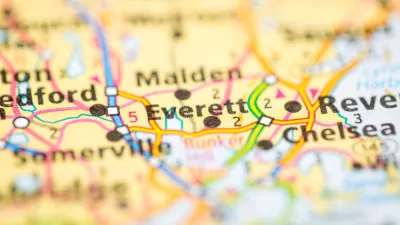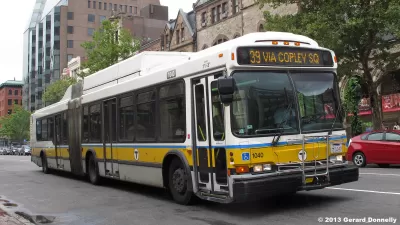A few blue-collar cities proximate to Boston offer case studies of the "opportunity bargains" identified in the 2018 Opportunity Atlas published by Harvard and Brown universities an the U.S. Census.

"Not long ago, a team of economists at Harvard University, Brown University, and the US Census Bureau published an extraordinary study of opportunity in America," writes David Scharfenberg. "And they were able to show with remarkable and often heartbreaking precision that where we grow up — down to the specific neighborhood — can have a profound influence on our prospects for moving up the economic ladder and grabbing a piece of the American Dream."
The study [pdf], "Opportunity Atlas: Mapping the Childhood Roots of Social Mobility," also revealed a surprising success story: the cities of Chelsea, Revere, Everett, and Malden, all just north of Boston on the other side of the Mystic River. Scharfenberg describes these "blue-collar cities" collectively, as "an unlikely engine of upward mobility in a land of greasy spoons and auto body shops and modest two-family homes with chain-link fences."
The study identifies these kinds of place, where relatively affordable neighborhoods can alter the course of low-income children's lives, as "opportunity bargains." Massachusetts does not claim sole possession of such opportunities bargains. There are similar opportunity bargains in Rhode Island, North Dakota, Nebraska, and California, for example. Scharfenberg says there are thousands of opportunity bargains in the country.
The article includes a discussion of the unproven theories about what makes opportunity bargains work, as well as interactive maps to illustrate the Opportunity Atlas's finding in New England.
FULL STORY: Miracle on the Mystic: Chelsea, Everett, and the New American Dream

Alabama: Trump Terminates Settlements for Black Communities Harmed By Raw Sewage
Trump deemed the landmark civil rights agreement “illegal DEI and environmental justice policy.”

Study: Maui’s Plan to Convert Vacation Rentals to Long-Term Housing Could Cause Nearly $1 Billion Economic Loss
The plan would reduce visitor accommodation by 25% resulting in 1,900 jobs lost.

Planetizen Federal Action Tracker
A weekly monitor of how Trump’s orders and actions are impacting planners and planning in America.

Wind Energy on the Rise Despite Federal Policy Reversal
The Trump administration is revoking federal support for renewable energy, but demand for new projects continues unabated.

Passengers Flock to Caltrain After Electrification
The new electric trains are running faster and more reliably, leading to strong ridership growth on the Bay Area rail system.

Texas Churches Rally Behind ‘Yes in God’s Back Yard’ Legislation
Religious leaders want the state to reduce zoning regulations to streamline leasing church-owned land to housing developers.
Urban Design for Planners 1: Software Tools
This six-course series explores essential urban design concepts using open source software and equips planners with the tools they need to participate fully in the urban design process.
Planning for Universal Design
Learn the tools for implementing Universal Design in planning regulations.
Caltrans
Smith Gee Studio
Institute for Housing and Urban Development Studies (IHS)
City of Grandview
Harvard GSD Executive Education
Toledo-Lucas County Plan Commissions
Salt Lake City
NYU Wagner Graduate School of Public Service





























